Question Number 65270 by Waseem Ahmad bhat last updated on 27/Jul/19

$${d}/{dx}\:{x}−\mathrm{2} \\ $$
Answered by Tanmay chaudhury last updated on 27/Jul/19
![y=x−2 y+△y=(x+△x)−2 △y=(x+△x)−2−y △y=x+△x−2−(x−2) △y=△x (dy/dx)=lim_(△x→0) ((△y)/(△x)) =lim_(△x→0) ((△x)/(△x))=1 answer or method formula (dx^n /dx)=nx^(n−1) ((d(c))/dx)=0 [c=constant value] so (d/dx)(x−2) =((d(x^1 ))/dx)−((d(2))/dx) =1×x^(1−1) −0 =1×x^0 −0 =1](Q65274.png)
$${y}={x}−\mathrm{2} \\ $$$${y}+\bigtriangleup{y}=\left({x}+\bigtriangleup{x}\right)−\mathrm{2} \\ $$$$\bigtriangleup{y}=\left({x}+\bigtriangleup{x}\right)−\mathrm{2}−{y} \\ $$$$\bigtriangleup{y}={x}+\bigtriangleup{x}−\mathrm{2}−\left({x}−\mathrm{2}\right) \\ $$$$\bigtriangleup{y}=\bigtriangleup{x} \\ $$$$\frac{{dy}}{{dx}}=\underset{\bigtriangleup{x}\rightarrow\mathrm{0}} {\mathrm{lim}}\:\frac{\bigtriangleup{y}}{\bigtriangleup{x}} \\ $$$$=\underset{\bigtriangleup{x}\rightarrow\mathrm{0}} {\mathrm{lim}}\:\frac{\bigtriangleup{x}}{\bigtriangleup{x}}=\mathrm{1}\:{answer} \\ $$$${or}\:{method}\: \\ $$$${formula}\:\frac{{dx}^{{n}} }{{dx}}={nx}^{{n}−\mathrm{1}} \: \\ $$$$\frac{{d}\left({c}\right)}{{dx}}=\mathrm{0}\:\:\:\left[{c}={constant}\:{value}\right] \\ $$$${so}\:\frac{{d}}{{dx}}\left({x}−\mathrm{2}\right) \\ $$$$=\frac{{d}\left({x}^{\mathrm{1}} \right)}{{dx}}−\frac{{d}\left(\mathrm{2}\right)}{{dx}}\: \\ $$$$=\mathrm{1}×{x}^{\mathrm{1}−\mathrm{1}} −\mathrm{0} \\ $$$$=\mathrm{1}×{x}^{\mathrm{0}} −\mathrm{0} \\ $$$$=\mathrm{1} \\ $$
